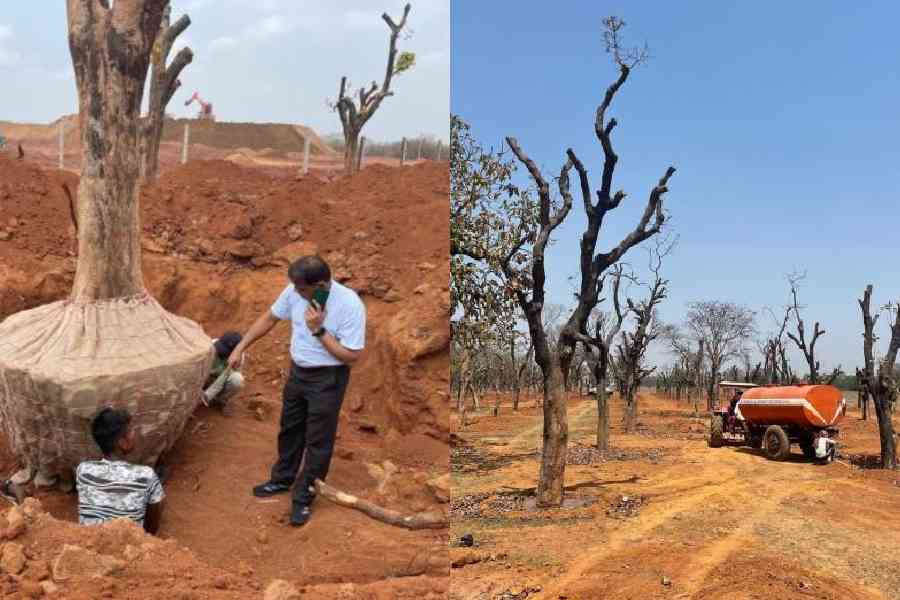The state administration on Thursday evening completed the translocation of all 984 trees from the site of the proposed Deocha-Pachami coalmine project in Birbhum district, a step necessitated to begin the first phase of work.
But it remains a challenge for the administration to ensure that all the trees survive at their new location.
The translocation began on February 14 and took around 83 days to complete. The trees included 755 mahuas (madhuca longifolia), 139 arjuns (terminalia arjuna) and 87 murga (celosia cristata). Two siris (Albizia lebbeck) and one bel (Aegle marmelos) were also among the translocated trees.
“We are very happy that the translocation of nearly 1,000 trees was completed successfully. This initiative was led by the state government, particularly our chief minister, who supported the translocation of these ancient trees in recognition of tribal sentiments,” said Birbhum district magistrate Bidhan Ray.
“We are trying our best to ensure 100 per cent survival of the transplanted trees,” he added.
Since the government announced a comprehensive compensation package for those who gave up land for the proposed coal mine in Birbhum district, it faced a new challenge with demands against any harm to the 984 trees located at a particular stretch of land.
A source said the state government decided to relocate all the 984 trees following demands and protests by tribal people of Deocha-Pachami, who have worshipped these ancient trees for generations.
The government appointed a Hyderabad-based agency, led by Ramachandra Appari, who has experience in translocating 1.7 lakh trees across the country since 2010. All those trees have been translocated to a new location, barely a kilometre away from their original site.
The translocation process was halted briefly because of protests by a section of tribal people opposing the coal mine project. The government is currently conducting basalt mining work, as the basalt layer needs to be removed to start coal excavation.
Multiple sources have said that completing the translocation cannot yet be considered a relief for the administration, as the success of the initiative depends entirely on the survival of the trees.
A major challenge in ensuring their survival is the need to provide adequate water for at least two months, or until the rainy season begins, in this naturally dry region with
rocky soil.
“After translocation, each tree needs around 150 litres of water every other day. Since the area is dry and water sources are limited, we have deployed multiple tankers to water the trees. We are happy that not a single tree has shown any signs of failing to survive so far,” said Babulal Mahato, an additional district magistrate overseeing the process due to his background in horticulture.
“We don’t see any threat to a single tree, so far,” he added.
A source said that apart from watering, the administration is also applying rooting hormones, termite-control pesticides, and organic nutrients to improve the trees’ chances of survival.
A senior government official said ensuring 100 per cent survival is crucial.
“It is natural that one or two trees may not survive after relocation. Although there have been no such signs so far, we remain cautiously optimistic for the next three months. The loss of multiple trees could trigger new protests among the tribal community,” the official said.










